After years of pleasing its fan base among social progressives and proponents of economic disruption, Silicon Valley finds itself in the hot seat. On October 31, legal representatives from Facebook, Google, and Twitter appeared before the House and Senate judiciary committees to discuss Russian meddling efforts in the 2016 U.S. election, including fake news stories and incendiary political ads propagated on the internet platforms and social media sites.
Public concerns inspired by the rise of big tech, however, are not exclusively grounded in the outsize political influence these companies wield. A recent and widely circulated Atlantic article examines the astonishing behavioral effects of smartphone and social media usage among today’s youth and paints a grim picture of tech-enabled isolation, depression, and social anxiety. Big tech is shaping our lives offline as much as online. Amazon’s acquisition of Whole Foods this past summer sparked the fear that the online giant had simply amassed too much power. Amazon’s quest for a second headquarters—what two Brookings experts call “Amazon Idol”—not only underscores this fear, but demonstrates the ability of a single tech company to dictate the terms of regional economic development. And with rising market concentration throughout the economy reinvigorating interest in antitrust law and enforcement, the hitherto unchallenged power of big tech hangs in the balance.
Writing about the general climate behind today’s resurgent antitrust politics, Carl Shapiro, the former Deputy Assistant Attorney General for Economics at the Department of Justice’s Antitrust Division, worries in a recent paper about the populist tendency to conflate a large swath of social ills and champion a “big is bad” mentality. Instead, he urges separating the concerns about concentrated political power from the concerns about concentrated economic power. Many experts steeped in the technocratic arcana of antitrust enforcement would agree.
The political roots of antitrust
Yet fear of the political power that results from increased economic concentration is at the heart of American antitrust legislative history.
The 1641 colonial legislature of Massachusetts’ Charters and General Laws declared, “There shall be no monopolies granted or allowed among us but of such new inventions as are profitable to the country, and that for a short time.” Thomas Jefferson sought to include an antimonopoly clause in the U.S. Constitution, and in 1890 Congress passed its first major antitrust legislation, the Sherman Antitrust Act. While Robert Bork’s seminal text, The Antitrust Paradox, argues that achieving consumer welfare was the sole aim of the act, the economist Christopher Grandy finds that consumer welfare failed to survive the legislative process.
Instead, legislators were just as concerned about the welfare of workers and entrepreneurs, and they were deeply fearful that corporate consolidation would threaten American democracy. Describing the origins of antitrust law, Supreme Court Justice William Douglas famously wrote in his dissent in United States v. Columbia Steel Co., that the philosophy of the Sherman Act “is founded on a theory of hostility to the concentration in private hands of power so great that only a government of the people should have it.”
The new technology trusts
So while fear that big tech can wield excessive influence in our democracy may reflect broader misgivings outside the realm of antitrust law and enforcement, some political concerns about big tech appropriately fall under the purview of antitrust regulation. As Sally Hubbard, a Senior Editor at the Capitol Forum who covers monopolization issues, recently stated in an interview with Vox’s Sean Illing, “Companies like Facebook and Google have had an outsize effect on political discourse because of the ways their algorithms help to promote and spread fake news and propaganda. Even if it’s not their intent, their business model invariably contributes to this problem.” More competition between rival platforms would have introduced a greater number of algorithms for Russian operatives to navigate, and probably would have mitigated the impact of the fake news that successfully targeted voters during the 2016 U.S. election.
Similarly, because the services offered by the likes of Google and Facebook are free (or low cost in the case of Amazon), tech companies have escaped the predatory pricing concerns typically triggered by anticompetitive high prices. However, Financial Times columnist Rana Foroohar has argued that we incur non-monetary costs when we use these services, handing over our attention and personal data.
Of course these two examples do not immediately elicit a clear solution for antitrust enforcement reform one way or the other, but they do illustrate that the dynamics of the tech era will require an updated conception and application of current antitrust law. While what this looks like remains unclear, a consensus is emerging that the Chicago School consumer welfare framework, formulated by Robert Bork and Richard Posner among others, has failed to capture today’s market power. In a widely-read note published in the Yale Law Journal, Lina Khan, a fellow at the Open Markets Institute, shows that the focus on low prices as the exclusive goal of antitrust cannot account for Amazon’s dominance.
While Khan documents how Amazon has escaped scrutiny from antitrust enforcers who have relied on the Chicago School antitrust framework for the past forty years, many argue that the predominant narrative behind tech’s rise is one of competition working, with consumers rewarding the companies responsible for superior innovation. This may be the case, but Peter Thiel has also celebrated tech’s dominance for precluding competition, declaring “competition is for losers.” Whether tech dominance marks the successful evasion of competition or a natural inclination toward monopolization remains a point of contention.
Little disruption in Silicon Valley
However, the persistent profitability of dominant tech companies raises the possibility that competitive forces are indeed under threat. An Economist article entitled, “The Problem with Profits,” warns, “Big tech platforms such as Google and Facebook need to be watched closely: they might not be rent-extracting monopolies yet, but investors value them as if they will be one day.” Today, Boeing barely outpaces Google as the company that spends the most on lobbying. Just five years ago, Amazon spent $2.5 million on lobbying the federal government, it is well on its way to spending nearly $13 million this year.
Other evidence suggests the weakening of competitive forces. The chances of start-ups succeeding have diminished. Even IAC, an internet company intent on supporting digital brands that challenge the power of the major tech companies, has “internalized a kind of working method that recognizes the Five as more-or-less permanent fixtures of the internet,” New York Times’ Farhad Manjoo reports. While Silicon Valley is home of the “disruption economy,” little disruption seems to be taking place. The vision of some enthusiastic geek working out of a garage able to one day displace today’s incumbents feels more and more like a far-fetched possibility.
Against this backdrop, the need for reform is vocalized across the political spectrum, from Elizabeth Warren to Steve Bannon. As one of us observed in a bipartisan policy briefing with Bill Kristol, “a growing body of research suggests… the growing dominance of these technology companies—and the platforms they control—come at a hidden cost to workers, consumers and our economy.” Some staggering statistics underscore this reality: Facebook owns 77 percent of mobile social traffic while Google owns 81 percent of the search engine market. Ninety percent of the world’s smartphones rely on Apple or Google operating systems and 50 percent of all money spent online goes through Amazon.
Addressing the challenges of big tech
So what can antitrust do when it comes to addressing the challenges posed by big tech?
First, it is time to abandon the Chicago School dictum that predatory pricing is “rarely tried” and “rarely successful.” The evidence simply does not support this claim. And even while consumers may benefit from low or below-cost prices, these prices may not necessarily serve as a good indicator of consumer welfare in the future. As the Economist has noted, consumers celebrated when prices at Whole Foods dropped following its merger with Amazon: “Both Amazon loyalists and Whole Foods shoppers are likely to enjoy the perks of the combination, and cheaper avocados will come as a relief to hungry hipsters.” But, the article continues, “The question hanging over today’s antitrust debates is whether startling deals for consumers—from Gmail to cut-price organic almond butter—are the happy by-products of innovation or the foundations of formidable barriers to competition, which will ultimately harm consumers.” The past does not paint a promising picture. After engaging in a price war with Diapers.com, Amazon undercut the company, acquired the diapers retailer, and then subsequently raised prices.
Second, the agencies should update their merger review guidelines (the vertical merger guidelines have not been updated since 1984) to ensure merger review includes an evaluation of the data at stake along with the monetary value of the deal.
Third, it is important to recognize that antitrust is just one tool in the broader competition policy toolkit. One of the greatest barriers to entry in the tech sector remains network effects—a marketplace dynamic when greater usage of a product makes it more valuable for all users. Here, success breeds more success. If you have 900 friends on Facebook, there’s little incentive to try out “Spacebook,” a new social media site that none of your friends have joined. Luigi Zingales and Guy Rolnik advocate a reallocation of property rights to combat the problem. Competition would be encouraged if individuals owned their social network and could easily move over to rival platforms.
Even if antitrust remains focused on economic issues—an approach we question—big tech challenges enforcement agencies to develop an analytical framework suited for the 21st century tech-driven economy. Consumer welfare is no longer an adequate standard—if it ever was.
Google, Facebook, and Amazon are donors to the Brookings Institution. The findings, interpretations, and conclusions posted in this piece are solely those of the author and not influenced by any donation.
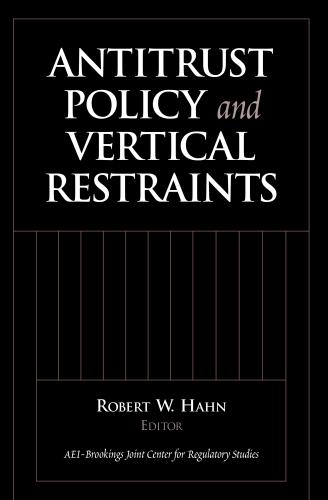
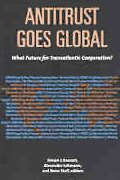

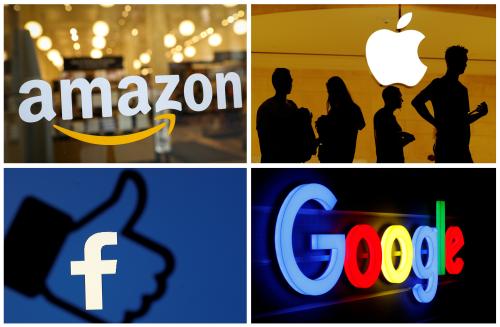
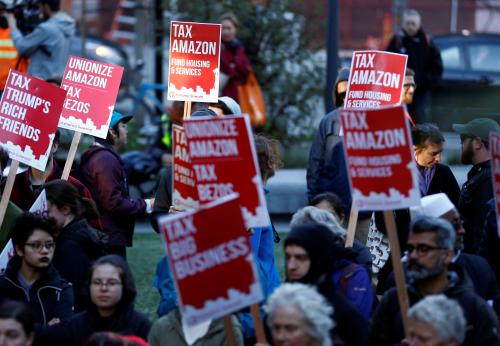
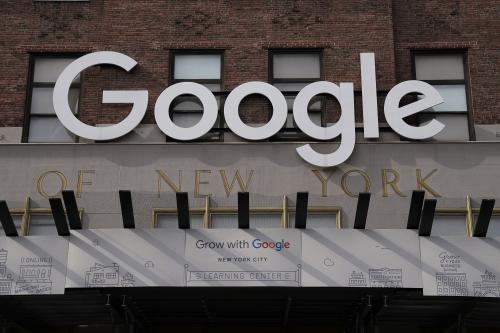





Commentary
Big technology firms challenge traditional assumptions about antitrust enforcement
December 6, 2017